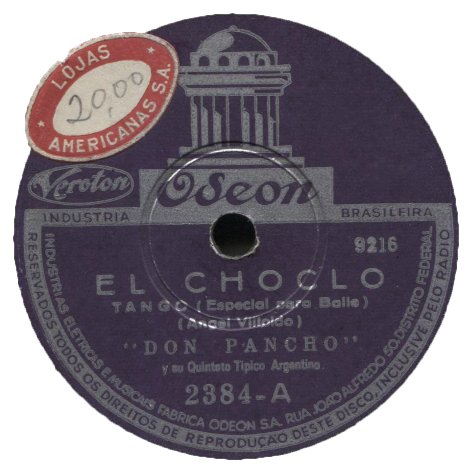
“Derecho Viejo”
Don Pancho y su Quinteto Tipico Argentino
(Odeon 2384 B mx 9340) March 15, 1938
“El Choclo”
Don Pancho y su Quinteto Tipico Argentino
(Odeon 2384 A mx 9216) November 15, 1937
Here are a couple of tango recordings from Argentina – though the transfers here are from a Brazilian pressing.
While tango music originated in and is associated with Latin America, during the 1920s and the 1930s it enjoyed worldwide popularity, especially in Germany and Eastern Europe.
Both songs on this record were already well-known classics by the time it was made.
“Derecho Viejo” was composed by Eduardo Arolas and first published in 1916, though it is believed that he wrote it as early as 1912. The song’s title translates into English as “Old Law.” Ariolas died in 1924 at age 32. In 1951, the song’s title became the title of an Argentine film based on Arolas’ life.
“El Choclo,” composed by Ángel Villoldo, dates back to 1903 and is one of the most famous Argentine tangos. The song enjoyed a highly successful 1952 revival in the United States when lyrics were added and it was retitled as “Kiss of Fire,” with big-selling recordings made by Georgia Gibbs, Tony Martin, Louis Armstrong, and others.
“Don Pancho” was a recording pseudonym for a quintette led by the popular Uruguayan-born Argentine bandleader Francisco Canaro. In Argentina, “Pancho” is a popular nickname for Francisco. In 1940, the pseudonym was changed to “Quinteto Pirincho”- “Pirincho” being a nickname for Francisco in Uruguay.
Canero also made recordings for Odeon under his own name. As far as I can determine, the recordings under his name seem to have been with a full orchestra, whereas the pseudonyms were used for recordings featuring only a quintette. You can find additional background information about his quintette recordings at this link.
I usually dislike it when people attach stickers other than music royalties stamps to record labels. But, in this instance, it is interesting in that it indicates the record was sold through the Brazilian discount retail chain Lojos Americanas and, for those who might be familiar with the Brazilian currency that was in use at the time, at what price.
